Blog posts about Crafting {:} a Life from people who were there:
- Crafting {:} a Life Unconference Day 1
- Crafting {:} a Life Unconference Day 2
- Crafting {:} a Saga
- Leaving PEI
- Fantasy Cartography
- Crafting {:} a Life
- Crafting {:} a Life initial impressions
- Press Pound to Publish
- Communication does count
- Crafting {:} a Blog
- Three Conversations about Blogging
- Unconference Aftermath / Unconference Forwarding
- Connection Problem
- Canada - Crafting {:} a Life (Flickr photos)
- Crafting {:} a Reflection
If you’ve written something I didn’t catch, please let me know.
Lost in all the hullabaloo this past week was Oliver’s last day of public school.
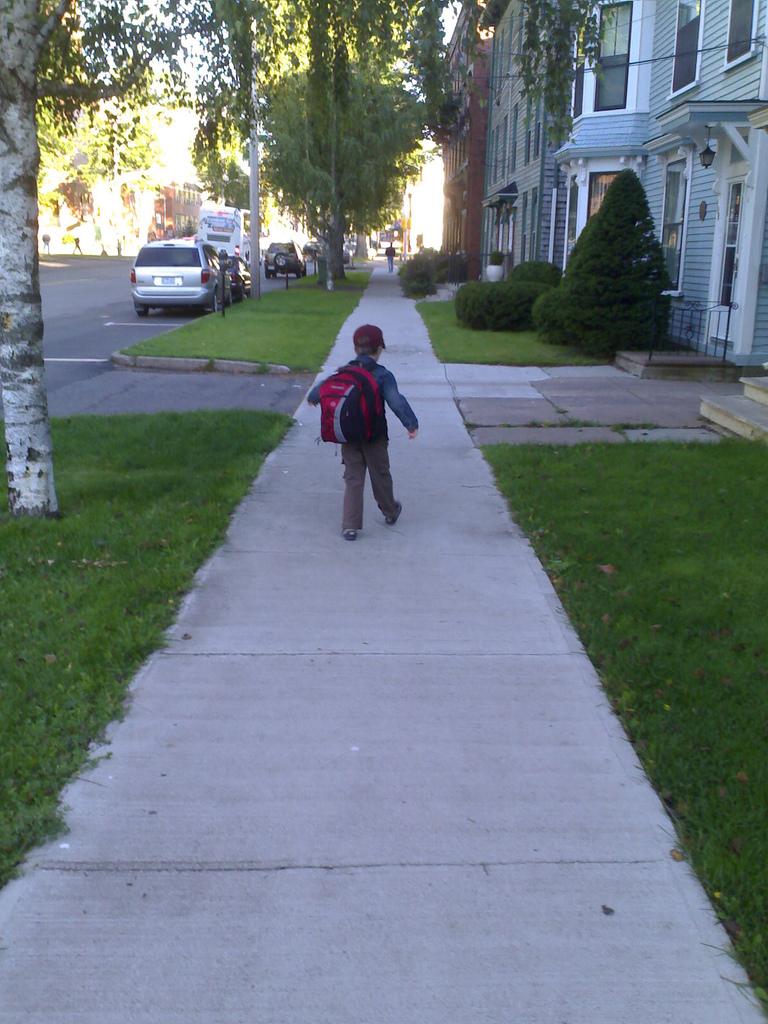 ,
, 
Ton Zijlstra wrote about the first day of our unconference.
There’s too much for me to process right now to write more myself, other than this snippet, written to a friend last night:
I realized that, by being the organizer of the unconference, I wasn’t really able to “go to the unconference” myself. Which is not to say that I was disappointed at all, just that my experience was necessarily different. More the palpable thrill of catalyzing connections. And the frightening/joyful realization that it’s possible to tenaciously conjure good things.
We gather for day two, starting with a walk to the Charlottetown Farmers’ Market, in 90 minutes.
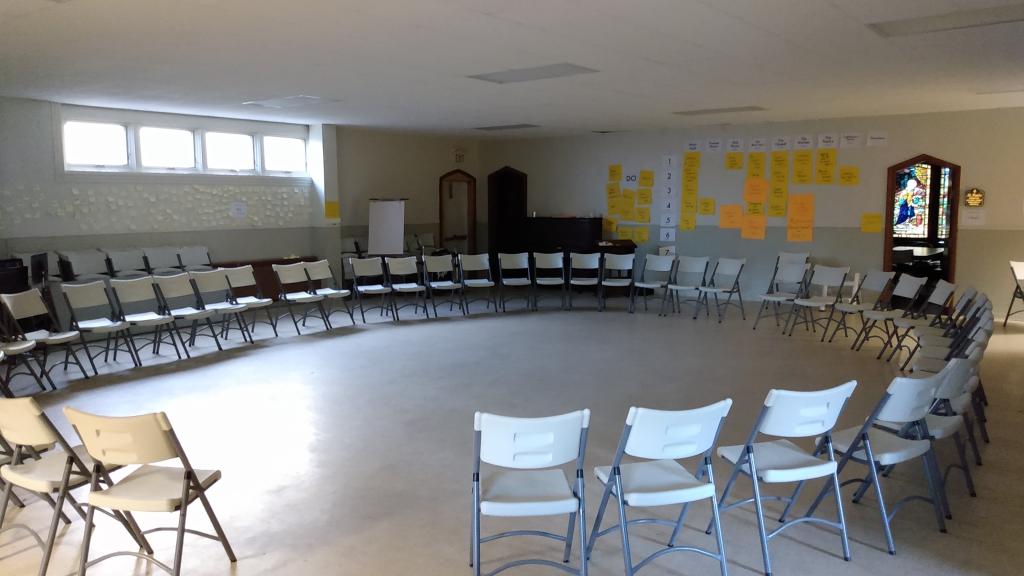
For years I’ve been suggesting people or chairs in a circle, but they always end up in neat rows, like a school classroom. It seems like overkill to organize an event just to realize this dream, but you do what you gotta do. Crafting {:} a Life starts in an hour.
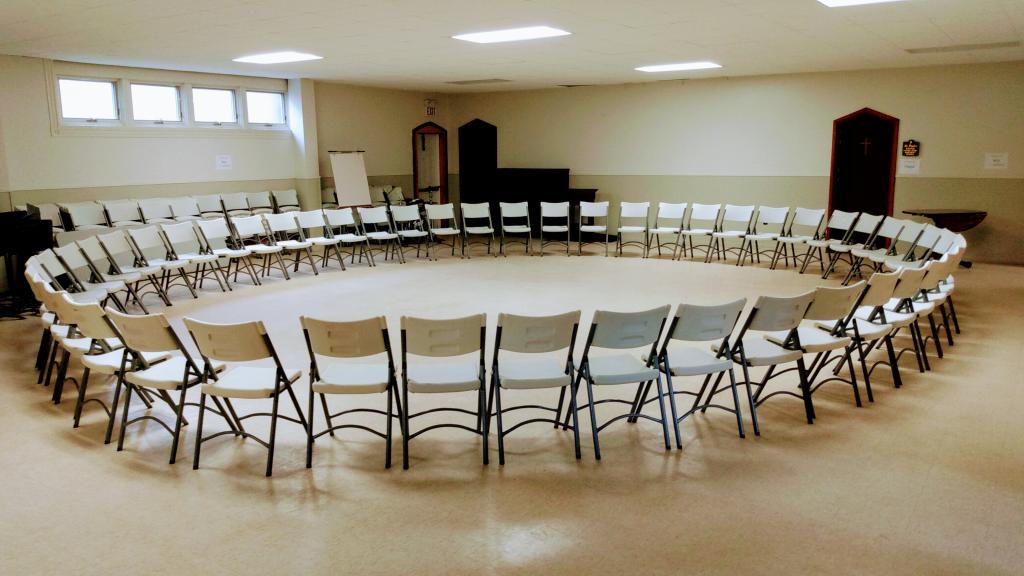
Amsterdam’s Removing 10,000 Parking Spaces is a short film about the Dutch city’s plan to do just that (link from Peter Bihr’s Connection Problem newsletter).
One of the things that we miss when we talk about the migration from internal combustion vehicles to electric vehicles is that, especially as long as we retain the private-ownership model, the need for parking remains.
It would be political suicide for a city councillor in Charlottetown to even hint at the notion of reducing parking; I’m not sure what the bridge to such thinking is.
But what a wonderful world it would be.
Insulate our House?
Our home energy audit last fall told us that if we insulate our basement and our walls at 100 Prince Street (neither of which have any insulation at all), we can reduce our household energy use by 35 GJ/year.
The audit estimates that we use 188 GJ per year in oil to heat our house, producing 13.4 tonnes of CO2; lowering that to 153 GJ per year would lower our emissions to 10.9 tonnes, a savings of 2.5 tonnes per year.
We got an estimate from Greenfoot of $10,286 to insulate the walls (“drill and fill”) and basement (“2lb closed cell polyurethane foam insulation”); Efficiency PEI rebates would lower this to $8,036.
Put all this together, over a decade, and we’d save 25 tonnes of CO2, spending $321/tonne to do so.
Buy an Electric Car
Five months into 2019 we’ve spent $176 on gasoline for our 2000 VW Jetta, a total of about 160 litres; extrapolating over a year, assuming roughly the same consumption, 32 litres a month, we’ll use 384 litres of gasoline in 2019.
According to this conversion calculator, 384 litres of gasoline produces 0.93 tonnes of CO2.
We could replace our Jetta with a 2014 Nissan Leaf electric car for about $18,000 all-in, and we could charge it only from renewal energy
If we did that, we’d spend about $18,000 and, over a decade, we’d save 9.3 tonnes of CO2, spending $1935/tonne to do so.
So, which one?
There are several assumptions and missing parts built into my calculations (including the assumption that our 2000 Jetta will live forever), but as a gross calculation it’s helpful for making decisions about where money is best spent.
Buying an electric car is sexy and exciting and Jetsonian but, at least for people who drive as little as we do, it makes more sense, dollar-for-tonne, to put our money into our walls.
Five years ago my friend John Muir, who died earlier this week, sent me an email.
His email began:
Apropos of almost everything, or nothing at, all have you seen these?
Those are links to videos of Curtis Driedger and Doug Cameron, performing as a stripped down acoustic version of the “post-punk/new wave power trio” the CeeDees. It was a great way to start an email, as I have been a fan of the CeeDees, and Doug and Curtis and their music foralmostever.
John continued:
This request might take a phone call.
There’s going to be an annual a prize for an undergraduate Trent student in my name, and I’m asking you to “help me” compose the description.
Here’s the background:
So, among many other things done and said, during the speeches on the glorious afternoon of Saturday August 9th this last summer (during the “Trent’s 50th Anniversary Reunion at Peter Robinson College”), Tom Miller announced that he was establishing a prize for an undergraduate Trent student in my name. (Do you remember Tom?)
No I had no idea, but that aside, now I need to draft some text to describe it. I like what you wrote about Trent Radio, and I will always savour what I can remember of the “fuck school” project.
Would you be up for this? Please say yes.
And if you decline, it’s okay, I will always love you.
But if you say Yes then read on.
Of course I said yes.
And read on.
Tom and his wife, Barb Chisholm, are going to give Trent University $25,000 which might yield about $500-750 annually.
They’ve asked me to write a description for it. All the scholarships, prizes, bursaries and awards are described in the calendar. I think we’re gunning for a prize rather than the other things (scholarships, bursaries and awards).
I like the tone of the Glassco, Hulcoop, McColl Turner & Gillian Stamp - Friends of Field Hockey Prize. I liked Lisa Howard’s idea of “exceptionality” rather than “excellence”. Would much prefer “a not very connected networks of exceptionality” vs “a centre for excellence.”
It could go to (a) someone who has done or attempted something interesting or humorous that involves Trent Radio, or (b) someone who somehow challenges the obstacles that a place like Trent University puts up in the way of peoples education in an interesting and/or joyful way.
I thought long and hard about this, looking for a way to reflect the spirit that John described; this is what I wrote back:
I am honoured that you would think of me, and I am open to the idea of writing something.
I’m not sure, from your request, how much latitude you have, and how much latitude you are looking for me to express.
That all said, here are my initial bullet-point-thoughts:
1. $500 isn’t very much. Looked at from a purely financial angle, relative to the cost of a university education, it’s not going to be transformative – it’s not likely to be the $500 that gets someone over the hump and into Trent, and it’s just as likely to melt into the background in the forest of complexity of financing an education. I know, for example, that I got the Blah Blah Blah Bursary my first year at Trent but I can’t recall at this distance – and likely didn’t even know at the time – who Blah Blah Blah was. It was simply $X that I didn’t have to devote from my Canadian Tire earnings the summer before Trent. I’m generalizing here, and it’s possible that $500 *could* be the difference between going to Trent and not going to Trent, but I’m not sure that’s the kind of hole that the John Muir Prize should be looking to fill.
2. The question for me, in that light, then becomes: how can one use $500 as a catalyst in a way that would be transformative. What CAN $500 do, or leverage, or start, that would be remembered 30 years later, that would have a positive impact on an individual and their community? One example from my own experience: as a Home and School president several years back I got together with the presidents of 4 other nearby elementary schools and obtained a $2000 grant to enable some sort of cooperative event, focusing on engaging parents, to be organized. $2000 wasn’t really enough to do anything substantial, but it turns out that the $2000 *was* useful as the shiny object that got the 5 of us in a room together: we held 5 meetings, each meeting in one of the cooperating schools; for many it was their first time darkening the door of another elementary school, and it was a tremendous aid in combating stereotypes that many of us carried around about the other schools. That, and the conversations that resulted, were far more important than the $2000 and what we spent it on, but it was the $2000 that catalyzed our discussions.
3. In *that* light, then, the question becomes: what kind of positive impact on an individual and their community do you, John Muir, want to have. My feeling is that tying the prize too tightly to Trent Radio, or to radio at all, misses the point. “Awarded annually to the person who commits their life to the pursuit of the campus-community radio dream” isn’t the play we’re trying to cast (I don’t think): rather, I think we’re trying to take the broader view, and look at what was and is special about you, and your deep and committed loving relationship with Trent Radio, and its relationship to Trent and to Peterborough, and abstract that out to encourage, catalyze, engender, spur others to pursue a similar (but likely entirely different, for all practical purposes) course.
4. Completely different tack: reading through the pages and pages and pages of prizes and awards and bursaries, I find them almost universally drop-dead uninspiring. So it seems like an area that could use some levity, some imagination, and some contrarianism.
I have no idea where this leads, but, again from my own experience, I can say that the greatest gift that you, and by abstraction Trent Radio, gave me while I was actually AT Trent was enough of a cataclysmic psychological shock required to propel me to re-conceiving of why I was at university in the first place. You demonstrated, by your words and your actions but even more so by your willingness to talk, that other things, other paths, other relationships to power, were possible. That was transformative for me and, I think, I am not unique in your acolytes in having gone through some variation of that experience.
This is summed up well here, by Stewart Brand, by way of explaining, in the opening line of the Whole Earth Catalog, “We are as gods and might as well get good at it.”
First in Edmund Leach’s words:
“Men have become like gods. Isn’t it about time that we understood our divinity? Science offers us total mastery over our environment and over our destiny, yet instead of rejoicing we feel deeply afraid. Why should this be? How might these fears be resolved?”
and then, in Brand’s words:
“By participating in history instead of standing by to watch we shall at least be able to enjoy the present. The cult of scientific detachment and the orderly fragmented way of living that goes with it, serve only to isolate the human individual from his environment and from his neighbors they reduce him to a lonely, impotent and terrified observer of a runaway world. A more positive attitude to change will not mean that you will always feel secure; it will just give you a sense of purpose. You should read your Homer. Gods who manipulate the course of destiny are no more likely to achieve their private ambitions than are men who suffer the slings and arrows of outrageous fortune; but gods have much more fun!”
I don’t know if you would align your take with those words, but those words certainly align with my experience.
If this resonates at all, then I would see the challenge to craft a prize that:
1. Is not drop-dead uninspiring.
2. Catalyzes something rather than simply discounts tuition.
3. Inspires, through that catalyst, something that has a chance of achieving a perspective-shift in one or more people.I don’t know how far you can push the bounds of what a “prize” is, but I’d like to hope that it can be targeted more directly at an event or an experience, and isn’t just a credit on a student’s account. If that is the case, then what I would suggest is something, in general, along these lines:
“Each year on the 2nd Friday of November, 5 students, one from each college, attend the John Muir Prize Supper. The students selected are those identified by their college head as being able to best benefit from a transformative experience – a kick in the intellectual head, so to speak – early in the first year at the university: students who are questioning their decision to attend Trent, their choice of academic emphasis, their position in the college community, or their larger role in the world. In addition to breaking bread together, those attending the supper are given the opportunity to develop, over the course of the evening, a designee of the John Muir Prize, a yearly cash award of $500. The choice of designee, made by consensus of the group, is open: the Prize may be awarded to an individual or group inside or outside the Trent community, based on whatever criteria those dining determine.”
I don’t know if the specifics are the right ones, but my point is this: the transformative power of the $500 lies not as much in the designee as in the designators, so position the heart of the matter in the deciding, not in the recipient. I don’t know what would happen at such a dinner – that is, partly, the point, of course – but at the very least you have 5 people who know each other at the end of the night, who’ve shared an experience together, who did something together. That seems like a pretty powerful proposition, and one very much aligned both with the Trent Radio philosophy and with the John Muir philosophy (at least as I interpret it).
I sent that to John, and then completely forgot about the John Muir Prize and what I’d written until this week, when I came across this in the Trent University Scholarships, Prizes, Bursaries and Awards document:
John K Muir Prize
Established by Tom Miller ’82 and Barbara Chisholm to recognize their friend, John Muir ’75, General Manager of Trent Radio. With more than 40 years of experience as a broadcaster, administrator and technician, John has been a creative force for the community and culture in Peterborough. To be awarded by a student committee to Trent-affiliated organizations, student groups or students who have been most influential in their own development.
Could they have actually done it?!
I was just making that shit up.
Well, not really: it was heartfelt and honest. But very much written in the spirit of “if the world was true and just, this is what would happen” with the implication that the world is not true and just, and that the prize would end up being awarded to the “communications-stream investigator most leveraging contemporary modalities toward academic excellence.”
But it turns out that John successfully transformed my draft manifesto into a compelling case.
And they did do it.
Trent University Magazine described the prize more fully:
Muir’s two-pronged approach to education is as simple as it is inclusive: everyone has creative potential, and the best way to learn is by doing. When guiding Trent Radio novices, he believes in giving just enough technical training to get them onto air. And then turning them loose. He refers to it as “deep-ending.”
And while Muir is there to rescue anyone who flounders, more often than not his pupils succeed admirably. Creativity reigns.
“My job,” he says, “is, essentially, making sure that other people can do weird and wonderful things.”
According to benefactor Dr. Tom Miller, one of the reasons that Muir is so successful as an educator is because he has an absolute love of learning.
“John is the quintessential lifelong student,” he explains. “He cherishes learning for himself and for those who are fortunate enough to know him. His passion for Trent Radio and what it represents to the University and the community makes John the creative, intellectual and artistic nexus for creative life at Trent and in Peterborough.”
Miller also recognizes Muir as a person who fosters development at both the personal and community levels.
“John helped create and orchestrate the exciting and creative incubator of ideas and talent that embodied Peter Robinson College, and that embodies Trent Radio today.”
Which makes the particulars of the John K. Muir Prize so appropriate.
Established by Miller and Barbara Chisholm, the prize will gather together a group of promising but academically at-risk students for a focused discussion about their impact upon the university community. The idea is to engage these students and actualize untapped potential.
Guided by a faculty member, the students will meet to unanimously decide on one or more Trent-affiliated organizations, students, or student groups to receive funding. They will be asked to consider which Trent-affiliated organizations, student services, or students have been most influential in their own development.
I love that this happened, and I love that the reason I was able to draft a description of the John Muir Prize was because of things I learned from John Muir.
I love that part of the inspiration for an academic prize was John remembering that I published a manifesto titled “Fuck School” back in the late 1980s (after I dropped out of the selfsame institution awarding the prize).
And, most of all, I love imagining the conversations that the John Muir Prize will inspire over the years to come, the kinds of conversations that John would love and that I would love.
After years of appointments in the cramped/cozy confines of the old Cornwall Post Office, today was my first at the new home of Cornwall Dental Clinic.
The new clinic is like a Brooklyn tech startup as if designed by Alex Colville. It’s rather pleasant, but also deeply unusual given what I’m used to.
Stephanie cleaned my teeth with undiminished efficiency and care.
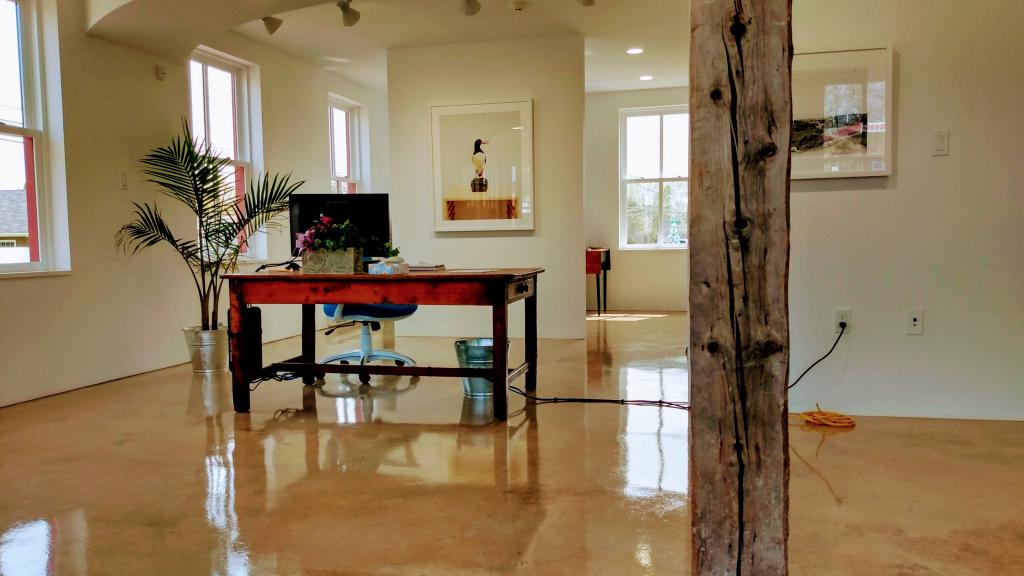
I received the sad news this afternoon that John Muir has died.
No person has played as many roles in my life as John: from the time I first met him in the fall of 1985 John was, by times, my mentor, my teacher, my landlord, my boss, my interrogator, my arch nemesis and my friend.
He was one of the most interesting people I’ve ever met, one of the smartest people I’ve ever met, and one of the most tactically arrogant people I’ve ever met.
John had ideas, if you didn’t agree with those ideas, or didn’t understand them, he took you for coffee or a meal until you did (either).
Last year around this time John found himself in an extended hospital stay, and he gave me a call. Over the course of that night, and the next few, we talked on the phone for 4 or 5 hours, all told. About all manner of things: our lives, our partners, our children, politics, free speech, public broadcasting, our friends, our shared past. Occasionally he’d have to excuse himself when a nurse came into exact some indignity, but he’d call back a few minutes later and we’d pick up where we left off.
We were in touch a few times by email in the year since, but that series of conversations was our last hurrah as friends, and I’m glad to have had the chance.
John and I shared a love of the music of Curtis Driedger, and I don’t think Curtis would mind if I have him play John out:
I Hope (That the World Doesn’t Blow Up Tomorrow) from Problem A.
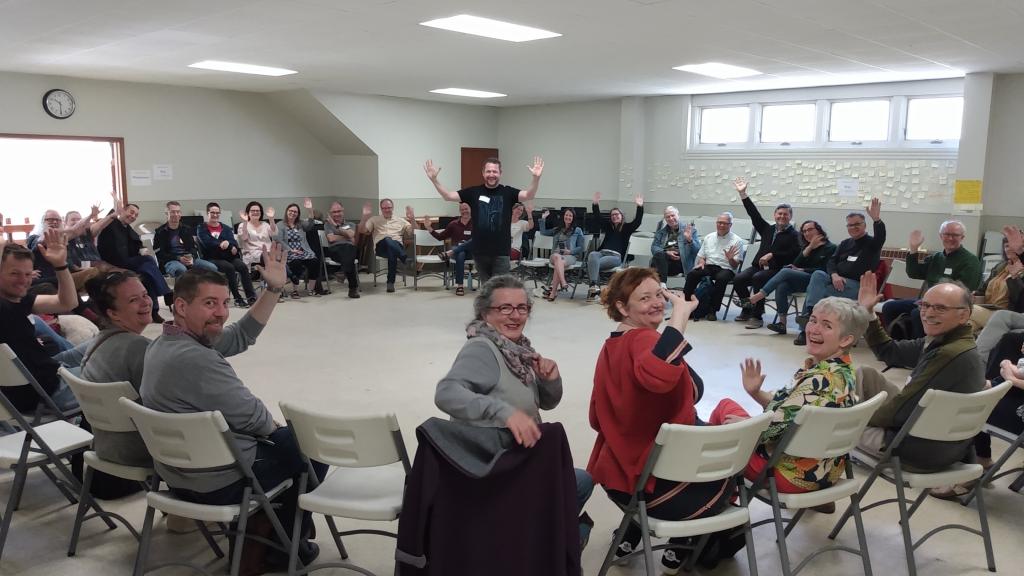
 I am
I am